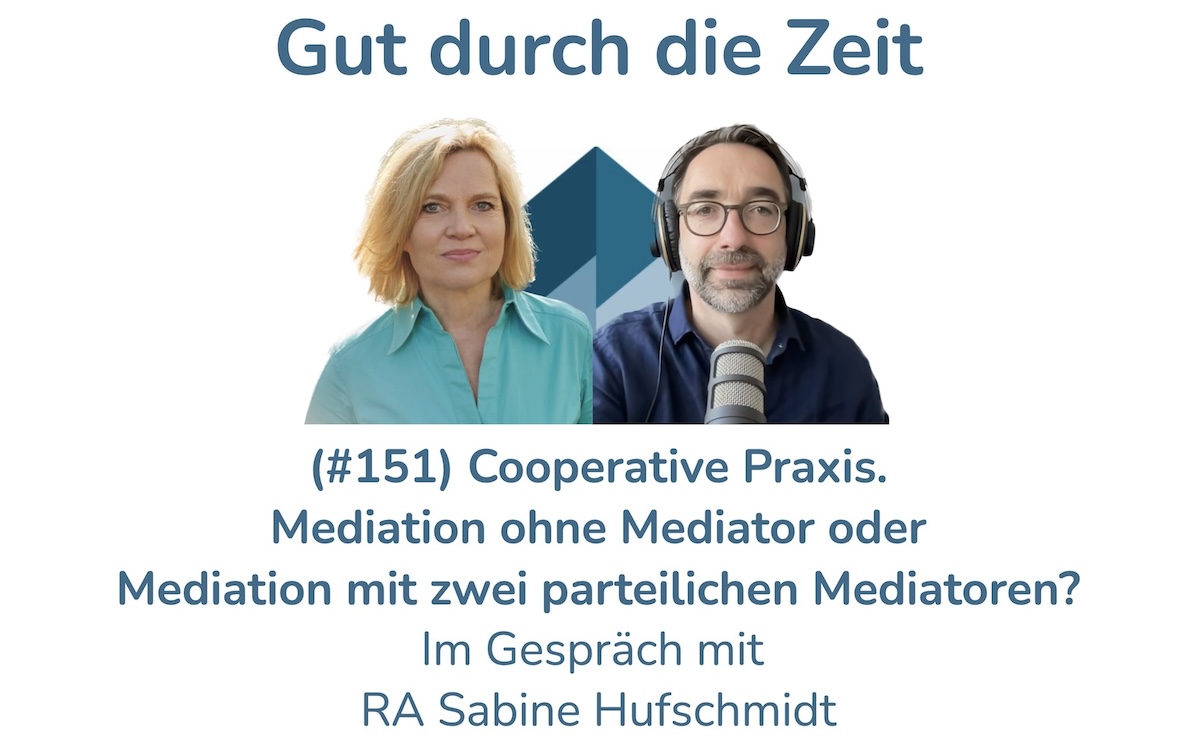INKOVEMA Podcast „Well through time“
#151 – Cooperative Practice / Collaborative Law
Mediation without a mediator or mediation with two partisan mediators? In conversation with lawyer-mediator Sabine Hufschmidt
Well through time. The podcast about mediation, conflict coaching and organisational consulting.
Sabine Hufschmidt is a lawyer and mediator specialising in family law, inheritance law and mediation. She is the founder of the law firm Hufschmidt Rechtsanwälte, which has been active since 1999. The firm offers legal advice in the areas of family law, inheritance law and mediation, specialising in family, inheritance and commercial mediation. Sabine Hufschmidt is also a professional business coach, a supervisor for mediators and a CP (Cooperative Practice) lawyer.
Contents
The cooperative practice approach
Independent negotiations offer the most intensive form of autonomous conflict resolution and the opportunity to utilise creative, strategically significant potential. The collaborative law approach from American conflict resolution practice is also committed to this. In Europe and Germany, the term cooperative practice is gaining acceptance.
Other terms are collaborative law or KoKon procedures.
Decisive is the the supporting role of the cooperatively negotiating lawyers of the parties to the dispute, which is practically a "mediation without a mediator". carry out. You therefore have the The dual role of being, on the one hand, formally biased representatives of the clients and, on the other hand, jointly and materially in charge of the mediation-analogue negotiation procedure to perform.
The condition: Disqualification clause
This dual role is flanked by a necessary limitation, the disqualification clause.
If the parties to the dispute have legal representatives, they will contact them directly anyway. What does collaborative law do differently from the usual cases where a legal adviser contacts the opposing party and raises claims and is then referred to the legal adviser or the latter responds?
Cooperative practice only comes about when the parties give their legal advisors the exclusive mandate for out-of-court negotiations and the latter only fulfil this mandate. The parties conclude an agreement in advance in which they limit the mandate of their lawyers to out-of-court negotiations from the outset and thus a procedural contractual disqualification clause introduce. This makes the commencement of court proceedings (with new legal advisors) „ artificially“ more expensive and reinforces the desire for an out-of-court solution, even for doubtful situations that arise during the disputed proceedings.
Similar to mediation clauses in contractual relationships, disqualification clauses in disputes are effective for future situations Restricting freedom or voluntarinessby using them in advance as an expression of freedom of self-determination. We are dealing here with the classic case of a Ulysses Pact This helps to ensure that wise considerations remain decisions and are not changed at the first temptation.





Leave A Comment